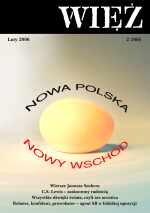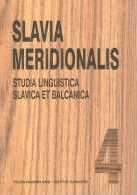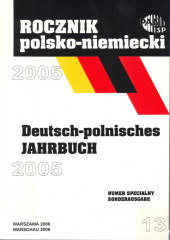
All Sounds of the World
Wszystkie dźwięki świata
Keywords: Amirkhanian
On the phenomenon of German features which are called “Hörspiel”.
More...
Keywords: Amirkhanian
On the phenomenon of German features which are called “Hörspiel”.
More...
Keywords: Poland - Catholic Church; political parties; Law and Justice; League of Polish Families; Radio Maryja; Tadeusz Rydzyk; Jarosław Kaczyński; Lech Kaczyński; Roman Giertych; Jan Rokita; Stanisław Dziwisz; Kazimierz Marcinkiewicz
Zbigniew Nosowski: Neither the Łagiewniki Catholicism, nor the Toruń Catholicism On the dangers of the planned by the party Law and Justice Fourth Polish Republic. Tomasz Wiscicki: With an Open Text On the changes in the Polish Ministry for Foreign Affairs and in the Polish embassies.
More...
Keywords: Poland – NATO; EU; European Union; Ministry for Foreign Affairs; Lisbon Strategy for Growth and Jobs; Law and Justice (PiS); Jarosław Kaczyński; Lech Kaczyński; EU – Bulgaria; EU – Romania;
“Poland is only big European country which has lost the independence for more than 100 years. That’s why the national security so important the Poles is.” The Poles do not consent to Russia’s attempts to dominate its neighbours.
More...
Linguistic representation of new extralinguistic reality and phenomena (with newly lexicalized denotata) establishes a relation between a newly opened referential conceptual world and the current, productive vocabulary, resulting in a broader socially functional capacity and effi cacy (funcionality) of the Slovene language. Electronic texts in conversational form are characterized by a structure highly resemblant of the structure of spoken texts, the main difference being in the pattern of turn taking, which is a media-related feature. E-texts also include communicative signals in the form of specific signs (various punctuation marks, suspension dots etc). Developmental semantico-syntactic changes are discussed primarily in terms of transitivity. As a categorial semantic component, transitivity makes part of the denotative meaning mainly of verbs and deverbal derivational expressions. As a systemic indicator of semantico-syntactic changes in verbs, it causes rearrangement of their meaning within a lexeme or it reveals and determines new meanings. Transitivity changes are analyzed for two types of verbs: (a) verbs which themselves denotate new extralinguistic reality (technical: digitalizirati/internetizirati vse, to digitalize/to internet everything, ekologizirati regionalni sistem, to ecologíze the regional system, internetizirati vse, to internet(ize) everything, piratizirati programe, to piratize software, poračunaliti vsa opravila, to computerize all tasks poskenirati sliko to skan a picture, to network with a system of channels, vitaminizirati margarino, to vitaminize margerine, tehnizirati kmetijstvo, to technicize agriculture, etc, or sociopolitical: albanizirati/ amerikanizirati/ argentizirati se/koga, to albanize/americanize/argentinize oneself/somebody, globalizirati družbo, to globalize society, internacionalizirati študij, to internationalize studies, regionalizirati dejavnost, to regionalize one’s activities, reprivatizirati lastništvo, to reprivatize ownership (=to restore private property), zdemoralizirati družbo, to demoralize society, etc; (b) verbs that only introduce new extralinguistic reality (igrati (se) na računalnik, to play with the computer/to play computer games, pognati programska okna, to run program windows, prostituirati se industriji, to prostitute oneself (=to sell out) to the industry, servisirati izstope na sisteme, to service access to systems, seliti se na strežnik, to move to (another) server.
More...
The paper analyses two groups of verbs in the Bulgarian language (primary imperfectives and denominal derivatives in -iram/-iziram, -uvam/-ovam), morphologically uncharacterized w.r.t. aspect and without suffixal aspectual correlates. In classical theories of aspect they are traditionally interpreted as biaspectual – i.e. verbs which, depending on their nominal and adverbial environment, function in certain conditions as imperfectives, in others – as perfectives. We have chosen, as a theoretical starting point to the analysis of such verbs, the theory of aspect of St. Karolak, where aspect is interpreted as a conceptual (universal) category, the aspectual component being an inherent constituent of the lexical meaning of the verb – that is to say, a specific aspectual concept cannot be subjected to transformation and elimination. Such an approach makes it possible to demonstrate that the concept of “biaspectual verb” in the above-defined sense is untenable and has no heuristic value. The analysis of the verbs from the two differentiated groups proves that, independently of their formal similarity, the verbs belonging to them relate to different aspectual classes and are the markers of aspectual structures, which are non-identical in character and in degree of complexity. It is necessary to point out that the aspectual oppositions in such verbs are achieved within their stems (present, imperfect vs aorist; present vs present), where it is possible to observe a semantic derivation and increase in complexity of the aspectual structure along with a change in the hierarchy between components, without this taking place in the manner typical of the Slavonic languages – by means of aspectual suffixes. Precisely this is the reason why such verbs are treated as “biaspectual”.
More...
The paper presents an investigation of the semantics of past passive participles derived from intransitive verbs and structures with the component ce, which marks a variety of semantic and syntactic changes in the proposition, as well as the functioning of predicative structures with such participles. The study is based on the methodology of semantic syntax and, in particular, on the understanding of the compound structure of complex concepts and the varying theme-rheme order of the arguments of the predicate – which opens possibilities for different conceptualizations of one and the same situation. We also refer to Prof. Karolak’s theory of aspect as a semantic category and on aspectual meaning as a configuration of the simple aspectual meanings of perfectivity and imperfectivity, as well as on his classification of verbs. An analysis is made of the dependency between the possibility to form passive participles out of ntransitive verbs and the semantic structure of the predicate, expressed by the respective verb. It is established that passive participles are formed out of intransitive verbs with the component ce, which are bearers of configurations of aspectual components with a specific semantic value, one of these being state – predominantly of inchoative configurations, semantically derived from resultatives, and of triaspectual telics, reduced in the aorist stem to inchoatives. We arrive at the conclusion that structures with the auxiliary "s'm" and passive participles of intransitive verbs are markers of statal passive and mainly express states from man’s emotional and mental sphere. Such structures are also used to code states of affairs as a result of processes and activities, which according to the speaker’s assessment are not subject to specification, are not brought about by intensional impact, are not observable, or their substantiation is not communicatively relevant.
More...
High frequency of VV clusters is typical for Albanian language. As can be seen foreign lexicon is the rich source of vocalic clusters occurring within morphemes. In the domestic words vocalic sequences are found mainly on morphemic boundaries. Thanks to the morphology of verbs the inventory of final VV clusters in Albanian words is quite rich too. Frequency of VV clusters in Albanian is compared with other Slavic Languages.
More...
Keywords: Croatian language; Slavonic linguistics
More...
In that paper the problem of modal markedness of causative constructions is discussed. Also the obligatory modal character of cause – effect relation (which indicates necessity of result) is questioned. The formal shape of causative expressions are taken under consideration, especially those which correspond with results. This problem is analyzed in terms of category of modality explicit model. It is pointed out that in causative sentences the different speaker's attitude concerning truth may occur and that causativity doesn't block the markedness of necessity/probability in propositional argument. It is proved that problem of causativity covers the very wide spectrum of phenomena. In this paper plenty of clause structures for Bulgarian and Polish – both analytic and synthetic – are presented.
More...
In the paper an inventory of the most typical segmental phenomena occurring on morphemic boundaries is given. A phonetic hierarchy of morphemic boundaries is established, according to the number and type of phonetic processes regarding segments occurring in a given position. With respect to the problem a difference between Serbian and Croatian is suggested.
More...
The paper reviews the syntactic-semantic structures including the realization of the relative temporal determination of the sentence predication by a nominal form – nondeverbal and deverbal – in the genitive case in the standard Serbian language. The author presents the semantic types (temporal identification, temporal quantification, temporal frequency) and corresponding syntactic models, discussing, in relevant cases, their special pragmatic characteristics. This paper deals with the analysis of a part of the semantic field of ‘hope’ in the contemporary Serbian language. The oncoming analysis is an illustration of the implementation of the semantic prime devised by Anna Wierzbicka to show the meanings of the verb „nadati se” (to hope), its synonyms, antonyms, as well as the Christian meaning of' „hope”. The classification of the meanings of the verb „nadati se” is looked at in the context of three different spheres of Apresjan's „picture of the world”, these being emotional, intellectual, and illocutionary.
More...
The Office (in Old-Slavic: služ.ba, in Greek: akolouthia) can be found in a medieval Bulgarian script (dated from the XlV/XVth century) which is stored in the Jagiellonian Library in Krakow (No 932). The script contains some hymn works indented for the Sundays of Easter period (post-paschal period). The Office dedicated to a woman martyr called Sunday (the name in a Greek version: Kiriakija, in a Latin version: Dominica) is a kind of work which is very rarely found in medieval manuscripts. The Office from the Krakow manuscript has been compared with Bulgarian one dated from the Xlllth century and with Serbian one dated the XVth century as well as with a printed Church Slavic version so as to determine the peculiarity and originality of this work (as far as the composition elements, the contents and the language are concerned). It is worth stating that both the individual features and the description of the woman martyr called Sunday presented in the Office of the Krakow manuscript are tightly related to Oration in praise of Sunday by Patriarch Eutymius.
More...
Keywords: Review
This review article is devoted to the book Riječi na granici punoznačnosti written by prof. dr hab. Snježana Kordić. The first chapter of the book deals with the semantic, grammatical and pragmatic characteristics of the personal pronouns ja / ti / on etc. (‘I / you / he’) in Serbo-Croatian and other languages. In the second chapter is discussed one of the pronominal semantic transpositions – the polite form Vi, which is the only one to have been conventionalised. A type of generalisation by means of the word čovjek also represents a pragmatically conditioned transposition, which is analysed in the third chapter. In the fourth chapter, the demonstrative pronouns in Serbo-Croatian ovaj ‘this’, taj ‘that’ and onaj ‘that’ are compared with their respective equivalent pronouns in Polish, Czech and Russian. The fifth chapter is devoted to the demonstrative words evo / eto / eno ‘behold, here is’. The sixth chapter examines the syntactic and semantic peculiarities of the composite conjunctions tim više što, tim prije što, utoliko više što, utoliko prije što, to više što in Serbo-Croatian (‘all the more because, all the less because’). The seventh chapter deals with Serbo-Croatian verbs imati ‘to have’ i biti ‘to be’. In the last chapter are described the meanings and grammatical features of the full and modal verb trebati ‘need/should’. This excelent and informative monograph is supplied with examples, carts, a subject index, an author index, a long summaries in English and German, and with eight bibliographies.
More...
The author talks about how and when the conjunctions da and kako can be used concurrently in a complex sentence in Serbian language. She claims that conjunction kako has variable signifícance, depending on whether it introduces a complement clause without any consequences to its semantics (neutral, not stressed conjunction kako1), or it introduces new additions to the semantics (semantically marked kako2), while conjunction kako3 can be at the same time compulsory determinant of the complement predicate, where it is not possible to exchange it with a complementary conjunction da. The author illustrates all the above mentioned usages of the complementary conjunction kako through examples from the literary texts of the Serbian writers from the end of 19th and the beginning of 20th century.
More...
Keywords: UNESCO; Schulbuchrevision; Willy Brandt; Helmut Schmidt; Warschauer Vertrag
„Die Bedeutung des Schulbuchs als grundlegendes Instrument im Prozess der Bildung und Erziehung wird wohl von sämtlichen Institutionen der Wissensvermittlung allgemein anerkannt und nicht in Zweifel gezogen. Dennoch tauchte nach dem Zweiten Weltkrieg in einigen Ländern Europas (darunter insbesondere in Schweden) unter den Pädagogen die Meinung auf, dass die Tauglichkeit des traditionellen Schulbuchs ihre Grenzen erreicht habe. Man versuchte, es durch moderne audiovisuelle Lernmittel zu ersetzen. Rasch stellte sich jedoch heraus, dass die Schulbücher weiterhin eine unerlässliche Informationsbasis für diese audiovisuellen Instrumente waren. Darüber hinaus sollte nicht übersehen werden, dass das Schulbuch in vielen Familien neben dem Gottesdienstbüchlein das einzige Buch ist, das den Lesehunger der Jugend aufrechterhält. […]“
More...
Keywords: Polen – Oppositionsbewegung; Menschen- und Bürgerrechte; 1976; Grenzrevision; Solidarität; Teilung Deutschlands
„Die „Ostpolitik" bzw. ursprünglich „Neue Ostpolitik" wurde in den 1960er Jahren konzipiert, auch wenn ihre Wurzeln bis in die 1950er Jahre zurückreichten. Ihr Fernziel war die Überwindung der Teilung Deutschlands und der Teilung Europas nicht durch die konfrontative Auseinandersetzung mit der Sowjetunion und den in ihrem Hegemonialbereich gelegenen Staaten, sondern durch die Umsetzung des neuen Paradigmas „Wandel durch Annäherung", also langfristige Überwindung des Status quo dadurch, dass man ihn zunächst anerkannte. Die Ostpolitik bewegte sich im Dreieck Bonn - Moskau - Ostberlin. Entsprechend der Prämisse „Der Schlüssel zur Lösung der Deutschen Frage liegt in Moskau" besaß die Politik gegenüber der Sowjetunion Priorität. Danach kam den Beziehungen zur DDR die größte Bedeutung zu. Deutlich nachgeordnet waren die Beziehungen zu den übrigen im Machtbereich der Sowjetunion liegenden Staaten, darunter Polen, dem allerdings aus verschiedenen Gründen unter diesen Staaten wiederum die größte Bedeutung beigemessen wurde. […]“
More...
Keywords: Egon Bahr; Prager Vertrag; Münchener Abkommen; Willy Brandt
„Die westdeutsche Ostpolitik Willy Brandts und seines politischen Umfelds wirkte sich außenpolitisch auf die kommunistische Tschechoslowakei in den Verhandlungen und dem darauf folgenden Abschluss des Vertrages über die gegenseitigen Beziehungen zwischen der Tschechoslowakischen Sozialistischen Republik und der Bundesrepublik Deutschland vom 11. Dezember 1973 aus. Das wichtigste außenpolitische Problem dieses Vertrages bestand in der Tatsache, dass die damalige Tschechoslowakische Sozialistische Republik kein selbständiger, unabhängiger Staat war, dessen Regierung das Volk legitim und demokratisch vertreten hätte. Im Gegenteil - dieses staatliche Gebilde war, ähnlich den anderen so genannten Ostblockstaaten, ein totalitäres kommunistisches Regime, dessen Außen- und Innenpolitik von der totalitären und kommunistischen Sowjetunion bestimmt wurde. Das wurde zudem in krasser Weise von der Tatsache unterstrichen, dass erst fünf Jahre nach den dramatischen Ereignissen vergangen waren, als die sowjetische Militärintervention in der Tschechoslowakei die damalige Reformbewegung gewaltsam erstickt hatte, die zur Wiederherstellung der tschechoslowakischen Demokratie hätte führen können. Mit anderen Worten, die Bundesregierung Brandts verhandelte auch im Falle der Tschechoslowakei mit einer Regierung, die ganz und gar illegitim war. […]“
More...
Keywords: Polish-German relations; Oder Neiße Grenze; zweite Berlin-Krise; Normalisierung der Beziehungen zwischen Polen und der Bundesrepublik
„Als die Machthaber der Volksrepublik Polen nach 1956 versuchten, in politische Gespräche mit Regierungsvertretern der Bundesrepublik Deutschland einzutreten, unterschied man von Anfang an zwischen der Aufnahme von diplomatischen Beziehungen und deren Normalisierung. Die Normalisierung des bilateralen Verhältnisses sollte allmählich aus der Anknüpfung diplomatischer Beziehungen erwachsen. Die Herrschenden in Warschau waren davon überzeugt, dass die Normalisierung letztlich von der endgültigen Überwindung der Folgen des Zweiten Weltkrieges abhing. Vorausgesetzt wurde also u.a. eine Wiedergutmachung des enormen Unrechts, das der polnischen Nation durch die Besatzungspolitik des Dritten Reiches angetan worden war. Diese Einschätzung der Normalisierung offenbarte nicht nur die polnische Diplomatie im kommunistischen Nachkriegspolen, sondern auch das Ministerium für Kongressarbeiten bei der Londoner Exilregierung. Zu den Mitarbeitern dieses Ministeriums gehörte auch Józef Winiewicz, der seit 1955 stellvertretender Außenminister der VR Polen war. […]“
More...
Keywords: deutsche Minderheit in Rumänien; Willy Brandt
„In Rumänien wurde die Frage der Ostpolitik bisher nur selten behandelt. Im Allgemeinen ist die Zahl der Studien über die Ostpolitik gering und nur ein breiter Zugang zu Archivbeständen und eine gründliche Untersuchung derselben könnten die Produktion auf diesem Gebiet entscheidend anregen. Vorerst decken dieses Gebiet nur Erinnerungen, Studien und Aufsätze ab, die von ehemaligen kommunistischen Funktionären veröffentlicht wurden. Sie behandeln entweder den Werdegang der kommunistischen Elite und ihre inneren Auseinandersetzungen oder selektiv Themen über die Anfangzeit des kommunistischen Regimes wie z.B. den Aufbau der kommunistischen Armee oder die Herausbildung des membership innerhalb der kommunistischen Partei. Für den vorliegenden Vortrag wurde im Archiv des rumänischen Ministeriums für Auswärtige Angelegenheiten, im Zentralen Historischen Nationalarchiv und im Rumänischen Militärarchiv geforscht. Aufgrund objektiver Umstände sind die Forschungsergebnisse jedoch sowohl lückenhaft als auch fragmentarisch. Lückenhaft, weil die untersuchten Archivbestände keine Dokumente zum Thema Ostpolitik enthalten. Relevante Informationen gibt es nur in Archivbeständen wie „Deutschland" und „Konferenz für Sicherheit und Zusammenarbeit in Europa" oder in jenen wie „Kanzlei des ZK der RKP", die vom Zentralen Nationalarchiv verwahrt werden. […]“
More...
„Die vorliegende Ausgabe des „Deutsch-polnischen Jahrbuches" unterscheidet sich recht stark von ihren Vorgängern. Es ist die dreizehnte Ausgabe der seit 1992 von der Forschungsgruppe Deutschland des Instituts für Politische Studien der Polnischen Akademie der Wissenschaften in Warschau herausgegebenen Schrift. […]“
More...